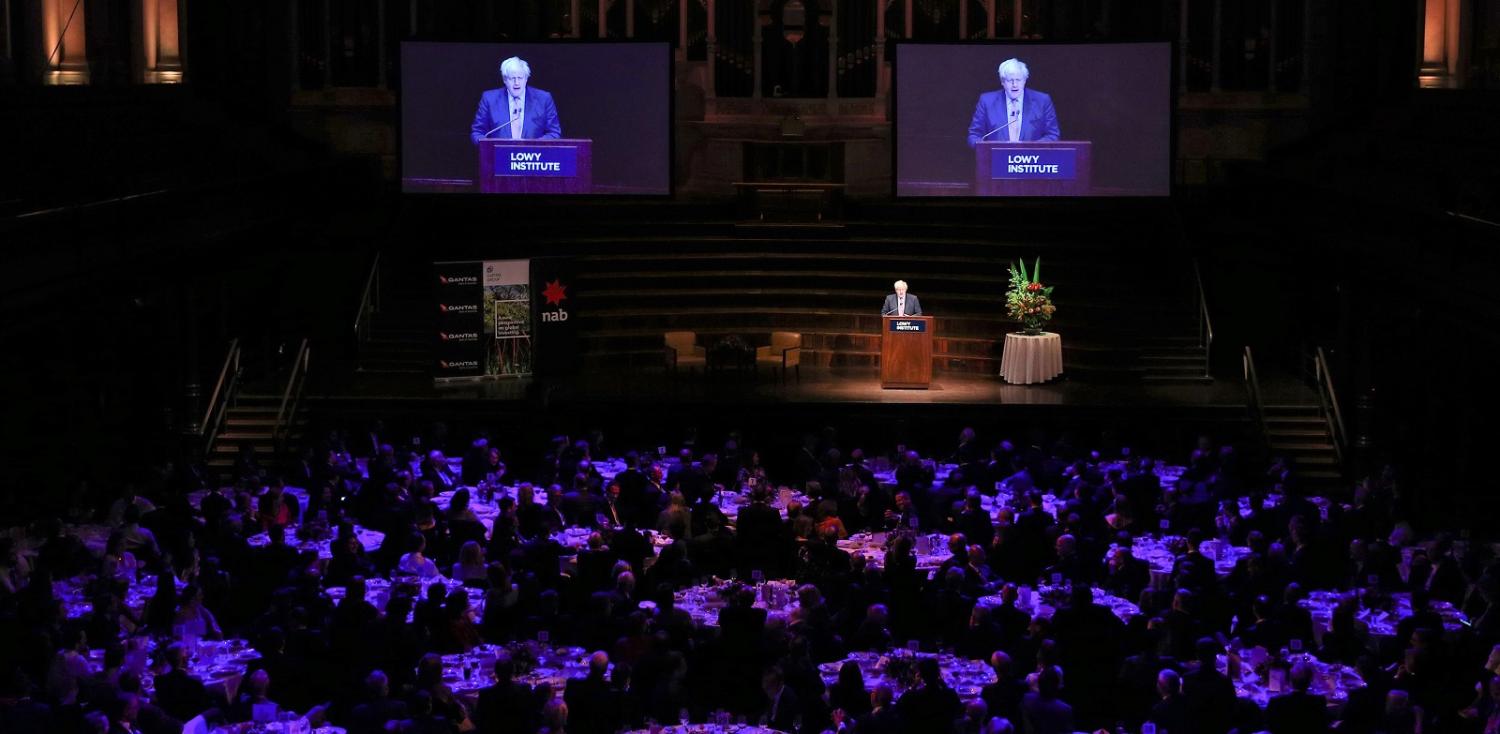Boris Johnson clearly has a soft spot for Australia.
No white bread politician, his whole manner is a breath of fresh air. Not only was he smart enough to renounce his dual citizenship, he has turned dishevelment into an art form.
He was at it again last night, delivering the 2017 Lowy Lecture at a packed Sydney Town Hall where he charmed his audience with a typically quirky presentation. It was a speech chock full of Australianisms, plenty of memorable one liners, and a paean of praise for Australia and its strong sense of national political and cultural identity.
Despite his patrician background, Johnson's jokey and anti pompous demeanour has enabled him to lead forthright debates at home and engage with a wide variety of major players abroad.
His enlightenment ethos and his unequivocal commitment to the Western alliance, and its key partners such as Australia, shine through.
We have no doubt benefited from his formative gap year at Geelong Grammar and his solid grounding in practical politics while Mayor of London from the Wizard of Oz, Lynton Crosby.
He has already said that a trade deal with Australia is top of the agenda, given that our ties are 'deep and enduring'. He is a strong internationalist, stressing that after leaving the EU Britain will be keen to strengthen its relationship with our region and particularly the ASEAN group. He is obviously not waiting for the smoke to clear from the protracted Brexit negotiations.
But Johnson's preference for the Anglosphere is pronounced. He was quick to quote his political idol Winston Churchill in lauding the 'special genius of the English-speaking peoples'.
This is refreshing, as the Anglosphere is a perennially underrated and under spoken about group. It is almost as though a collection of Western, prosperous, highly advanced, white-dominated countries is somehow politically incorrect, rather than trailblazers in espousing democracy, the rule of law, an independent judiciary and even, as Johnson reminded us, 'the absolute freedom to make fun of politicians'.
British politicians and bureaucrats often tend to have a rose-tinted view of the Commonwealth and its potential.
But from my experience, as leader of the Australian delegation to the 19th Commonwealth Heads of Government Meeting in Kampala, Uganda in November 2007, the Commonwealth has a long way to go. Most of the attendees were semi-detached from proceedings. Some, like the then UK PM, Gordon Brown, who managed to keep Prince Charles waiting for several hours and then left early, clearly saw it as not much more than a chore. He was not alone - many other leaders didn't bother to contribute on the floor.
The problem with the Commonwealth is that it is not much more than a talk shop because it has no serious resources, human or financial, to deploy. Johnson understands this and has his sights set on the ties that bind - days after the US election he said it was very important not to pre-judge the incoming President, whose election could be a good thing for Britain.
He clearly envies Australia's now non-porous borders, our nationally independent courts, and our ability to control our own destiny.
Having advocated an Australian points-style immigration system during the Brexit campaign, he well understands that it was open door immigration 'wot won it' for Leave. In 1955 Winston Churchill expressed alarm that the number of new arrivals in Britain had reached 10,000. Compare that to today's annual average of more than 600,000.
Johnson is also no doubt acutely aware that our two countries have major financial synergies - London is top of the global financial hubs and Australia has the fastest growing, and the third largest, pool of assets under management in the world. The UK ranks number two in foreign investment into Australia, and the largest in agricultural land.
Given that his Brexit ally and potential leadership rival Liam Fox has conceded that the Brexit transition could last up until 2022, Johnson has plenty of time to prepare for bilateral deals. Whilst hamstrung to some extent by EU rules, the UK is perfectly free to negotiate extensively, albeit in 'draft' format.
Australia-UK high level ties have come a long way since AUKMIN talks on foreign policy defence and security issues were inaugurated in the Howard-Blair years. It used to be said that if Australia and the UK were any closer it would be indecent, and Johnson reiterated this when he said that talks with his Australian colleagues had been marked by 'an almost embarrassing failure to disagree'.
He was at pains last night to point out that our per capita GDP is 25% higher than the UK's.
In many ways, despite our current political travails, Australia is a role model for the UK, even thought it is three times our population and lives at the axis of the developed world. Indeed in looking at what Australia has achieved, Johnson saw grounds for 'boundless excitement and optimism'.
Nationalism became a dirty word post WW II and is still a term of abuse in some left intellectual circles. Yet it was the driving force in breaking up the world order and national boundaries in the second half of the 20th century, so much so that the United Nations now has close to 200 members, compared to 51 - including Australia - at its foundation in 1945.
Nations always yearn to run their own affairs without outside dictation - so do individuals. Our currently quiescent Republican movement is but another example. The people of Britain strongly believed this last year as they resisted incessant bullying from the business and cultural elites - and Boris Johnson astutely recognised this as he surfed to an historic Brexit victory. He is now well placed to help lead his country to true independence and a new era of greatness.

